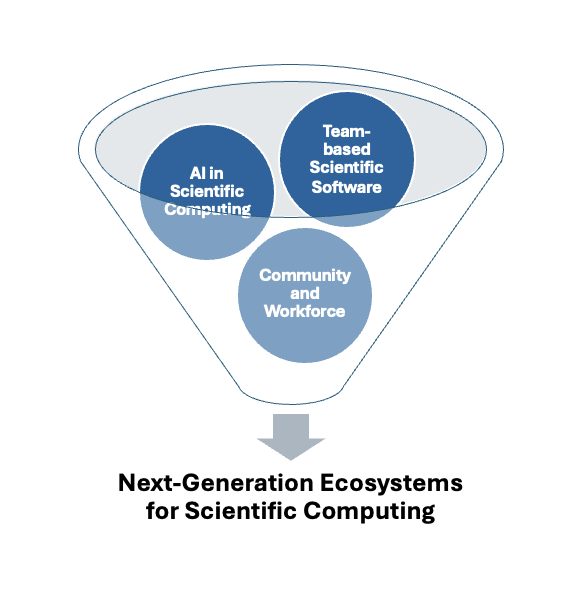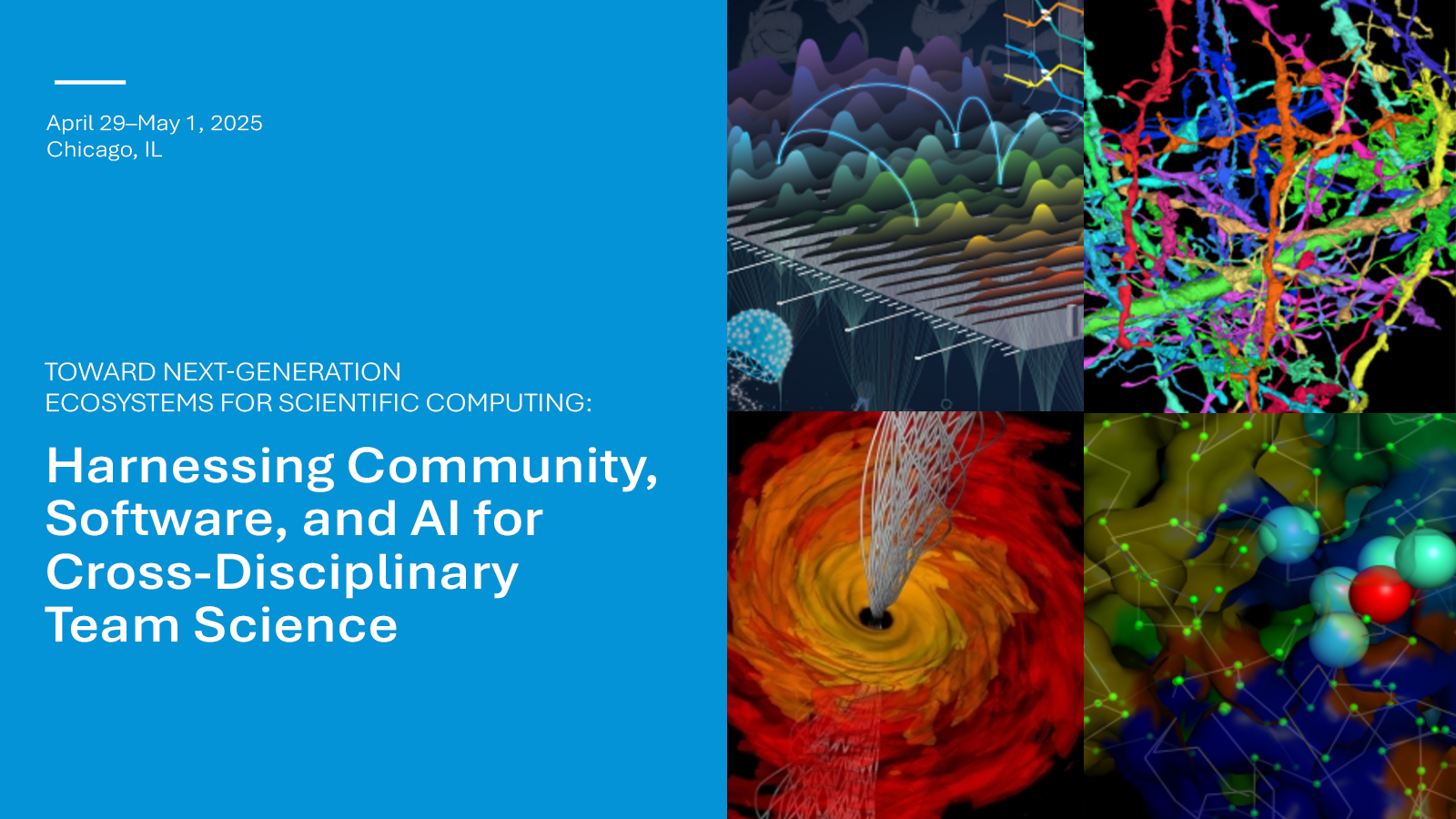Workshop Organizing Committee:
- Lois Curfman McInnes, Argonne National Laboratory (ANL), chair
- Dorian Arnold, Emory University
- Prasanna Balaprakash, Oak Ridge National Laboratory
- Mike Bernhardt, Team Libra
- Beth Cerny, ANL
- Anshu Dubey, ANL
- Denice Ward Hood, University of Illinois Urbana-Champaign
- Mary Ann Leung, Sustainable Horizons Institute
- Olivia Newton, University of Montana
- Stefan Wild, Lawrence Berkeley National Laboratory
Workshop Charge:
The high-performance computing (HPC) community has long been a leader in advancing scientific discovery to new frontiers. High-quality scientific software—which encapsulates expertise across disciplines for use by others—is a primary means of sustained collaboration and scientific progress. Motivated by urgent issues raised in recent community reports on the state of scientific software development and AI for science, energy, and security, the workshop will bring together cross-disciplinary experts—in HPC, AI, computational science, applied math, computer science, research software engineering, cognitive and social sciences, and community development—to identify challenges, prioritize gaps, and explore opportunities that will shape next-generation ecosystems for scientific computing. The workshop will follow a co-design methodology that intentionally weaves together topics in team-based scientific software, AI in scientific computing, and community/workforce development, thereby ensuring a truly holistic approach.
Areas of emphasis: Our goal is to assess and transform team-based scientific software, with emphasis on building ecosystems to address the needs of next-generation research in scientific computing, while advancing emerging AI technologies. We will integrate technical and community considerations throughout discussions on:
- Software and next-generation science
- Exploring how new scientific frontiers and heterogeneous computing architectures require new approaches for software and workforce development.
- Incorporating community-building strategies to ensure that new technical solutions reflect the perspectives and expertise of all stakeholders representing a broad swath of backgrounds.
- Software ecosystems for AI in scientific computing
- Mapping pathways to create robust, scalable software ecosystems that catalyze AI-driven discoveries in HPC contexts and produce increased innovation.
- Developing more robust AI tools and resources for scientific computing that address current gaps and include wide-ranging perspectives.
- Team-based software and cross-disciplinary research
- Identifying roles, methodologies, and best practices for team-based scientific software.
- Emphasizing community co-design, where software solutions evolve through iterative dialogue among scientists, developers, and end users.
- AI for scientific software productivity and sustainability
- Addressing how varied perspectives and AI can accelerate development, use, performance, and impact of scientific software.
- Embedding community-based feedback loops to align AI-driven tools with real-world needs and foster broader engagement.
- Community and workforce development
- Accelerating strategies to cultivate future-generation R&D teams in the computing sciences.
- Fostering collaborative environments that tap into the strengths of a broad workforce, bridging technical and community-building efforts.
Workshop Objectives:
We aim to shape a forward-looking plan for the future of team-based software in scientific computing, along with actionable strategies to bring it to life, all while cultivating a vibrant community. Key areas of focus—considering emerging AI technologies and the needs of cross-disciplinary research—will include:
- Understanding scientific software practices: Building a shared understanding of methodologies for team-based software in HPC, explicitly integrating technical and community perspectives.
- Characterizing roles and success factors: Identifying critical roles in scientific software teams and community-based success factors that sustain effective software development and user engagement.
- Identifying challenges and opportunities: Examining gaps—both technical and community-driven—that hinder team effectiveness and highlighting opportunities to address emerging research needs.
- Envisioning the future: Considering bold ideas for next-generation scientific software, emphasizing synergy between technical solutions and community dynamics.
- Fostering community development: Developing actionable steps to strengthen the workforce and build a vibrant software community prepared to meet urgent challenges in HPC and AI-driven scientific computing.
By intentionally blending technical and community factors, the workshop aims to shape a future where thriving, cross-disciplinary communities drive the next wave of scientific discovery, with high-quality scientific software as a keystone of sustained collaboration and scientific progress.
Workshop Outcomes:
Participants will map the landscape of team-based scientific software, characterize key roles and success factors, prioritize focus areas, and develop strategies to shape the future of scientific computing. These integrated insights—to be documented in a post-workshop report—will inform future efforts and may drive changes in perspectives, policies, and practices throughout the scientific computing community.
This workshop marks the first of a three-year series dedicated to strengthening team-based scientific software in an AI-driven future, with each year incorporating the co-design framework to ensure that both technical and community needs are addressed:
- Year 1 emphasis: Identifying and understanding challenges, gaps, and opportunities
- Year 2 emphasis: Developing and evaluating strategies and progress
- Year 3 emphasis: Coordinating ecosystem-wide advancements that meld technical solutions and community-building
By intentionally weaving community considerations into technical discussions—and vice versa—this three-year series will continuously expand the community base and help to advance next-generation scientific discovery.
NOTE: Registration is by invitation only

